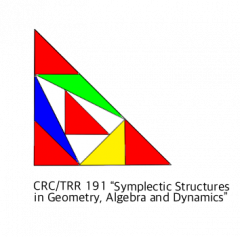Program
8:30
Registration
Registration
9:00 - 10:00
Moduli Spaces of Branched Projective Structures (Gustave Billon, Université Côte d'Azur)
Moduli Spaces of Branched Projective Structures (Gustave Billon, Université Côte d'Azur)
Abstract: Complex projective structures, or PSL(2, C)-opers, play a central role in the theory of uniformization of Riemann surfaces. A very natural generalization of this notion is to consider complex projective structures with ramification points. This gives rise to the notion of branched projective structure, which is much more flexible in many aspects. For example, any representation of a surface group with values in PSL(2, C) is obtained as the holonomy of a branched projective structure. We will show that one of the central properties of complex projective structures, namely the complex analytic structure of their moduli spaces, extends to the branched case.
Coffee Break
11:00 - 12:00
Generalized cluster structures and periodic difference operators (Michael Gekhtman, University of Notre Dame))
Generalized cluster structures and periodic difference operators (Michael Gekhtman, University of Notre Dame))
Abstract: I will present a construction that ties together of several diverse notions including spaces of periodic difference operators, Poisson sub manifolds of a Drinfeld double of GL(n) and subsets of Grassmannians stable under the action of powers of a cyclic shift. The theory of generalized cluster algebras serves as a unifying theme. Time permitting, I will discuss potential applica- tions to representation theory of quantum affine algebras at roots of unity.
Based on a joint work with M. Shapiro and A. Vainshtein and an ongoing project with C. Fraser and K. Trampel.
Lunch Break
13:30 - 14:30
Bicycling geodesics and elastic curves (Sergei Tabachnikov, Pennsylvania State University)
Bicycling geodesics and elastic curves (Sergei Tabachnikov, Pennsylvania State University)
Abstract: One models a bicycle as a directed segment of a fixed length that can move so that the velocity of the rear end is always aligned with the segment. A bicycle path is a motion of the segment, and the length of the path, by definition, is the length of the front track. This defines a problem of sub-Riemannian geometry, and one wants to describe the respective geodesics.
In this talk I shall discus three variations on this theme: the planar bicycle motion, the bicycle motion in multidimensional Euclidean space, and the planar motion of a 2-linkage (a tricycle?) Somewhat unexpectedly, in each case, the classical elastica play a prominent role.
14:45 - 15:45
Continued Fractions and the Four Color Theorem (Richard Schwartz, Brown University)
Continued Fractions and the Four Color Theorem (Richard Schwartz, Brown University)
Abstract: I'll explain a (well-known) version of the famous 4-color theorem which has a geometric flavor to it. I then describe some experiments I did concerning solutions to the 4-color theorem on triangulations having maximum degree 6. These triangulations are appealing because they are grouped into finitely many infinite families having to do (thanks to Thurston) with complex hyperbolic lattices. One concrete result I got is a nice connection between continued fractions and these 4-colorings, in a special case.
Coffee Break
16:30 - 17:30
Contemplations on the equilateral pentagon (Jürgen Richter-Gebert, TU München)
Contemplations on the equilateral pentagon (Jürgen Richter-Gebert, TU München)
Abstract: If you take 5 bars of equal length and join them together in a cycle, you get a simple mechanism.
Factoring out trivial motions you are left with two degrees of freedom. So in principle the space can be controlled by a point in the plane. If you face yourself with the question of how these *two* degrees of freedom can be related to the positions of the *five* bars in the most symmetric way you enter a mathematical rabbit hole. Along the way you will meet moduli spaces, hyperbolic geometry, symmetric hyperbolic tilings, conformal maps, Kepler Poinsot polyhedra, hypergeometric functions, regularization problems, non-linear optimization, perhaps even Fourier approximation and many more. The talk will be about the mathematical journey that arises from the simple desire to create an animation of the equilateral pentagon controlled by a point in two dimensions.

